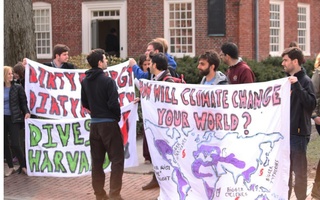Harvard supported shareholder proposals calling on corporations to be more transparent about political contributions and internal environmental benchmarks, among other issues, according to a report on shareholder responsibility released Wednesday.
The University—which invests in companies across the globe—relies on the recommendations of two subcommittees of the Harvard Corporation, the University’s highest governing body, when voting as a stakeholder. In 2016, the committees reviewed 77 issues, nearly a third of which were related to corporate political contributions and lobbying expenditures, according to the report. They also considered proposals on corporate methane emissions, disparities in pay between men and women in the workplace, and private defense contracts in Israel.
An advisory committee—a 12-member panel of faculty, students, and alumni—first considers each proposal before presenting its recommendation to the Corporation committee, whose four members cast votes to determine Harvard’s position. In 2016, members of the Corporation committee included Corporation Senior Fellow William F. Lee ’72, University Treasurer Paul J. Finnegan ’75, Corporation member Nannerl O. Keohane, and Corporation member Jessica T. Mathews ’67. Harvard Law School professor Howell E. Jackson chaired the advisory committee.
For seventeen proposals calling on companies to commission reports on company lobbying—in sixteen cases direct lobbying, and in one case indirect—both committees voted in favor of all of the proposals, as they have in past years. The report notes that the volume of similar proposals has increased since the Supreme Court's ruling on Citizens United v. Federal Election Commission, which ended several restrictions on independent corporate political contributions.
On the environment, the committees abstained on seven of twenty-four proposals, sometimes deferring to policies established by the federal government. For a proposal on greenhouse gas emissions presented to energy giant Chevron, the Corporation committee voted to abstain from requesting the company adopt “long-term, quantitative, company-wide targets for reducing greenhouse gas emissions” to limit global climate change to a warming of 2 degrees Celsius.
“Members remarked that by urging the company to adopt targets to reduce emissions from its products as well as its operations, the proposal, in effect, asks Chevron to reduce the scope of its business—an objective that could be seen as contradicting shareholder interests,” the report reads.
Another environmental proposal requested that Kinder Morgan—an energy infrastructure company dealing mostly in natural gas—release a report detailing ways the company is monitoring its level of methane emissions. The committees voted in favor of the proposal.
Resurfacing from 2015 was a proposal to Chevron that would require the company to report on its efforts to “minimize the adverse water resource and community impacts from the company's hydraulic fracturing operations.” The Corporation committee again voted in favor of the proposal.
The Corporation committee also voted to abstain on a proposal that called on PepsiCo to publish a report on steps the company might take to minimize impacts its insecticides have on bee colonies.
With concern rising over national opioid addiction rising, the committee saw a proposal this year calling for Johnson & Johnson, Abbvie, and Merck to compile a report on company policies for safe consumer disposal of prescription drugs. The committee abstained from voting on the proposal.
The Corporation committee did vote against proposals that asked Intel, General Electric, Coca-Cola, PepsiCo, United Parcel Service and McDonald’s to adopt a “Holy Land Principle”—a set of guidelines designed to prevent employment discrimination against Palestinians in Israel.
Harvard did not support shareholder proposals calling on Boeing to divulge detailed information on its business relationship—namely its sale of weapons—with Israel, financial institutions to prohibit “golden parachutes,” or financial compensation, for executives departing for government positions. It abstained from voting on a proposal to compel Citigroup to prepare an internal report about its alleged gender pay gap.
—Staff writer Brandon J. Dixon can be reached at brandon.dixon@thecrimson.com. Follow him on Twitter @BrandonJoDixon.
Read more in University News
Students Puzzle Over ‘Surprising’ Unionization Vote CountRecommended Articles
-
A Game of PressureT O SOMEONE untrained in the ins and outs of shareholder responsibility, almost every proxy resolution that comes before Harvard's
-
Corporation Abstains On Nuclear ResolutionThe Corporation yesterday decided to abstain on a shareholder resolution that calls on the American Telephone and Telegraph Company (AT&T)--in
-
University Considers Plan to Hire Instructor as Formal Debate CoachThe University may break past policy by offering an instructor a paid position as director of debate, it was learned
-
 Students Rally for Harvard To Divest
Students Rally for Harvard To Divest -
 Corp. Voted on Social Media, Corporate Tax Policy Shareholder Proposals in 2018
Corp. Voted on Social Media, Corporate Tax Policy Shareholder Proposals in 2018













